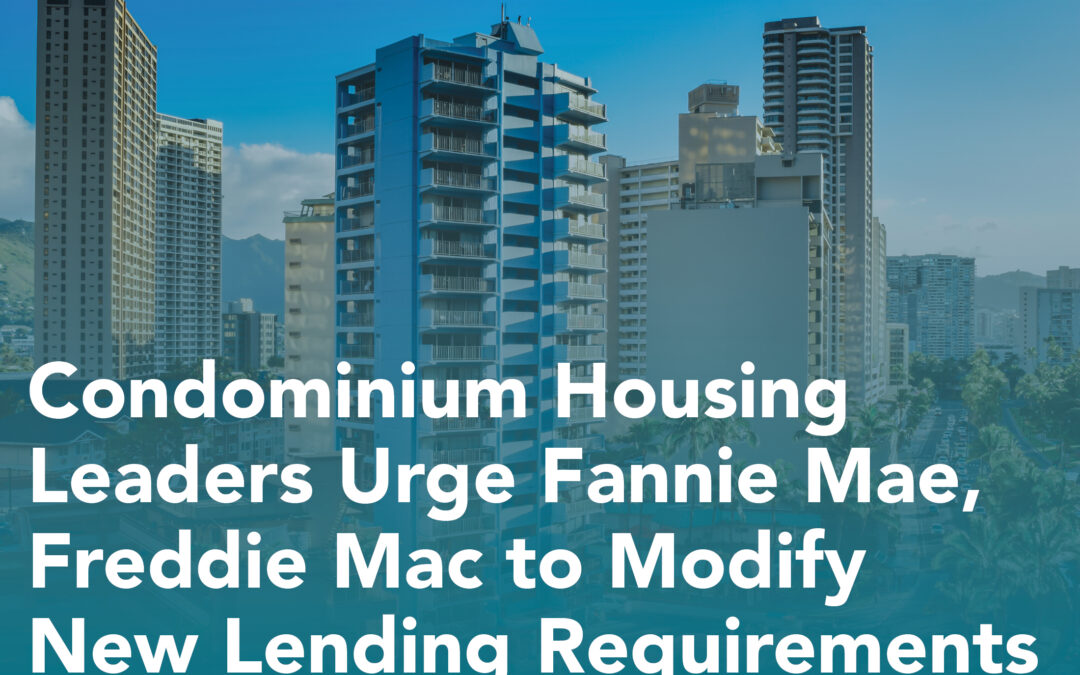Updated lending questionnaires introduced last year by Fannie Mae and Freddie Mac have resulted in restricted access to mortgages and created condominium building “blacklists,” impacting thousands of affordable housing units in the U.S., according to Community Associations Institute, the international leader for community association education, governance, and management. Community associations, commonly referred to as condominiums, homeowners associations, and housing cooperatives represent nearly 30% of the U.S. housing stock.
The Orange County Register reports that Fannie Mae and Freddie Mac hold concerning “blacklists” that prohibit mortgage financing for entire condominium or housing cooperative buildings. As the list grows, buildings have no knowledge they are on the targeted lists, and condominium project managers or boards of directors aren’t able to access the lists. When people are unable to buy and sell units in these buildings, the economic supply and demand principle indicates that property values will lower. Further, homeowners will have less money to fund regular maintenance in the buildings, leading to deferred repairs that will result in higher costs.
In a 2022 letter to the Federal Housing Finance Agency, which oversees the mortgage financing companies, CAI, community banks, lenders, and real estate agents expressed significant uncertainty and concern over the temporary condominium and cooperative project eligibility requirements released and implemented immediately, without comment or time to prepare, by Fannie Mae and Freddie Mac.
“In nearly every city in America, condominiums offer affordable housing options and access to housing for low to middle income families and the country’s growing aging adult population,” says Dawn M. Bauman, CAE, CAI’s senior vice president for government and public affairs. “CAI supports the intent of the requirements to ensure buildings are safe for homeowners and to minimize a mortgage lender’s exposure to risk. However, changes need to be made without restricting access to mortgages for homeowners living in condominiums and housing cooperatives.”
CAI and other stakeholder industries have held meetings and sent letters requesting changes, time for implementation, and narrowing the scope of the lending requirements. CAI conducted a survey of condominiums and housing cooperatives and found the following:
- 90% of the respondents represent condominiums and 11% represent housing cooperatives.
- 72% of respondents say they have been impacted by the updated Fannie Mae and Freddie Mac lending guidelines.
- 22–28% of respondents indicate they experienced a lender denial due to issues related to the questionnaire, not concerns pertaining to building safety.
- 30–42% of respondents indicate they have experienced significant delays in lender approval due to challenges pertaining to the new lender questionnaires.
Under the Federal Housing Finance Agency’s conservatorship, Fannie Mae and Freddie Mac are set to release permanent guidelines that have been developed in secret with no public comment process. There is industry fear the guidelines will be even more restrictive, resulting in more problems in the condominium and housing cooperative real estate market.
CAI is urging FHFA to immediately make the following adjustments:
- Change the condominium and housing cooperative project or loan approval program so that it is subject to a 90-day public comment period.
- Narrow the scope of the application requirements to buildings using an evidence-based practice that could include geographic location, age and height of the building, and type of construction.
- Allow for limited review of projects if they are not under evidence-based practices.
- Require Fannie Mae and Freddie Mac to make public the condominium projects ineligible for lending.
CAI developed a guidance document to help homeowner leaders and community managers navigate the current lending requirements in their communities. Jeff Collins, a mortgage lender and journalist for The Orange County Register, outlines some of the problems with the lending regulations in a recent article.
>>If you are experiencing condominium or housing cooperative lending issues in your community, please contact your Congressional representative today.




I find some of the comments are disingenuous. Lenders can find out if a condominium association is on the ineligible list.
You are really seeking that the UNDERWRITERS be subject to 90-day notice. They have a right to not get stuck with bad loans. There is a HUGE problem out there with serious deferred maintenance and being seriously underreserved, in addition to serious code violations esp fire code and structural.
You aren’t helping potential buyers to try to keep them from buying a nightmare, or current unit owners who need to realize that nobody wants to lend to potential buyers because of the serious lacking.
If you decided you wouldn’t loan to a young adult son or daughter, unless they clean up their act, should your neighbors be able to force you to? No. You want privacy and no interference from the government where it “advantages” your perspective, but you don’t want others to have the right to survival, such as the underwriters.
Your reasoning fails.
I should have added, lenders CAN find out if an association is on the ineligible list, they can have access to the database, AND the lender can inform a buyer.
I asked a lender and was sent a spreadsheet of all condominium associations on the ineligible list for my state, which you call a blacklist. They don’t want to put condominium associations through the same process over and over, once they have been deemed ineligible, and to me, it seems like very good reasons that protect buyers from buying a nightmare. Underwriters don’t have to make bad loans, they want to make money, and take reasonable risks. Good luck forcing them. I don’t understand how CAI doesn’t perceive it is good to be denied a loan on a property where many times serious issues are not obvious to a buyer and they unknowingly buy into a huge problem. I see this as a good way to get associations to clean up their act.